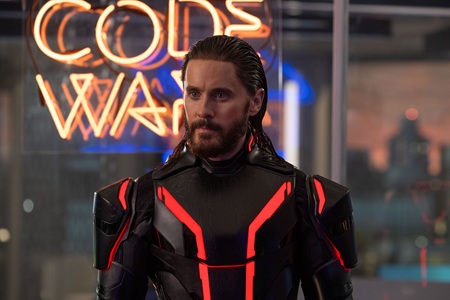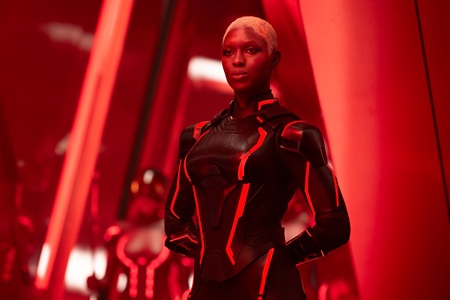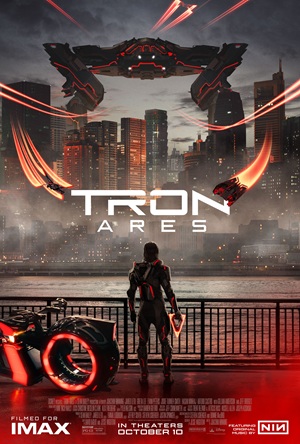
Visually Rambunctious Tron: Ares Makes the Digital Physical
It’s hard to think of a more frustrating — yet also lastingly influential and mesmerically enthralling — Hollywood studio franchise than the world of TRON. The first film, directed by Steven Lisberger and released back in 1982, received wildly mixed reviews, underperformed at the box office, and earned two Academy Award nominations (for its costume design and sound). It then spent 28 years building up a giant cult following and inspiring countless artists to unimaginable heights.
Its sequel, Tron: Legacy, released in 2010, earned equally mixed reviews, also fell short of expectations at the box office, spawned a hit Daft Punk soundtrack, received an Oscar nomination for its sound editing, and helped plant director Joseph Kosinski (Top Gun: Maverick, F1: The Movie) on a path that led to A-list behind-the-camera superstardom. In the succeeding 15 years, the film has also amassed a substantial following, big enough to get Walt Disney Pictures to dive back into this cybernetic wonderworld for a third time.
Enter Tron: Ares. Directed by Disney veteran Joachim Rønning (Maleficent: Mistress of Evil, Pirates of the Caribbean: Dead Men Tell No Tales) with workmanlike efficiency (and far less ambitious creativity than either Lisberger or Kosinski), this sequel’s plusses and minuses pretty mirror the prior installments. But while neither he nor writers David DiGilio (Eight Below) and Jesse Wigutow (It Runs in the Family) seem interested in pushing boundaries or taking giant risks, they still craft a moderately wild, decently fun ride of mayhem, destruction, and video game–inspired ingenuity. Just don’t expect a great deal more.
Over a decade after the events of the previous picture, Encom is now run by Eve Kim (Greta Lee), a Kevin Flynn (Jeff Bridges) disciple who, after the death of her beloved sister, is eager to return the tech company to greatness by bringing the digital realm alive in ways no one previously thought possible. But it’s a race against time. Her company’s greatest rival, Dillinger Systems, now run by Julian Dillinger (Evan Peters), the cocky, morally bankrupt grandson of founder Edward Dillinger (played back in 1982 by the late, great David Warner), is also after the same tech breakthrough, and he’ll stop at nothing to get there first.
The cybernetic world comes into play in that both companies have found a way to bring creations off of Flynn’s “Grid” and allow them to manifest in the real world — but only for 29 minutes. This includes Dillinger’s Master Control program, otherwise known as Ares (Jared Leto), who is charged with protecting the company’s cybernetic domain while also being its major weapon against all adversaries. But after a glimpse of the real world and learning all there is to know about Flynn, Kim, and so much more, the program discovers it has outgrown its creator. Ares wants physical permanence, and so he disregards Dillinger’s orders to erase his competitor and teams up with Kim as her protector instead.
It gets slightly more convoluted, with various subplots battling it out for supremacy as characters race back and forth between The Grid and the human world. Honestly, though, if you step back, it’s pretty straightforward. Everyone is after a lost code that can give these otherwise digital creations physical longevity outside of cyberspace, and, much like Pinocchio or David in Steven Spielberg’s A.I., Ares longs to be a real boy. That’s basically it.
Of course, the idea of these cybernetic creations leaping outside of the computer and into the physical realm was already hinted at in Tron: Legacy, so it’s not shocking that this sequel would want to follow through on the promise of that concept. The thing is, Rønning and company seem almost determined to disregard as many facets of Kosinski’s sequel as possible, and while the characters portrayed by Garrett Hedlund and Olivia Wilde are briefly mentioned (and continually referenced via photographs), neither makes an appearance. Stranger still, Tron (and even his human doppelgänger Alan Bradley) aren’t around at all; they’re not mentioned, even in passing, and that’s a mystery no one in this installment seems to care to solve.
Be that as it may, where Rønning excels is staging breathtaking action sequences that utilize the IMAX frame beautifully, each shot with precision by cinematographer Jeff Cronenweth (The Girl with the Dragon Tattoo) and edited to perfection by Tyler Nelson (The Batman). There’s a Lightcycle chase that must be seen to be believed, a kinetic masterclass of adrenaline, rambunctious visual effects, stunt choreography, and suspense that held me giddily spellbound. There’s another during the climax when a massive Recognizer busts into the real world and creates all sorts of unimaginable havoc, in which Rønning confidently blurs the line between the practical and the digital with skillful exuberance.
Another highlight is a brief segue back into The Grid of the 1982 film, complete with unexpected selections from legendary composer Wendy Carlos’s iconic electronic score and a requisite appearance by a jovial Bridges. What makes the sequence so marvelous is that it isn’t nostalgia for nostalgia’s sake. Instead, it propels the story forward with character-driven urgency, and, if anything, it’s a pity we don’t spend more time there. Interesting questions are asked; precious few of them receive an answer.
There are other virtues worth emphasizing. Leto underplays his questioning AI algorithm nicely, and for a character purposefully named after the Greek god of war, the lack of histrionics is refreshing. Even better are Lee and Jodie Turner-Smith. The former adds an emotional intricacy that is otherwise absent from the adrenalized thrills and chills of the constant action. The latter plays Athena, a fellow resident of The Grid and Ares’s trusted lieutenant. When he goes rogue, she’s the one tasked to bring him down and complete his mission of destroying Kim. Turner-Smith is magnificent, and the full magnitude of her performance is something I didn’t see coming. This is one of the year’s best supporting turns.
As terrific as all that is, there’s still something frustratingly underwhelming about the ending. Rønning blatantly sets up further sequels with a pointless cliffhanger and an annoying postcredit scene. None of the themes involving AI’s insurgency into the real world are satisfyingly pondered, let alone dealt with in a manner that might provoke meaningful conversation. There’s little about Tron: Ares — other than Turner-Smith, the visuals, sound design, and the undeniably glorious score by Nine Inch Nails (aka Trent Reznor and Atticus Ross) — that I’m going to be thinking about for much longer than the time it took to write this review. I find that curiously disappointing.
– Review reprinted courtesy of the SGN in Seattle
Film Rating: 2½ (out of 4)









